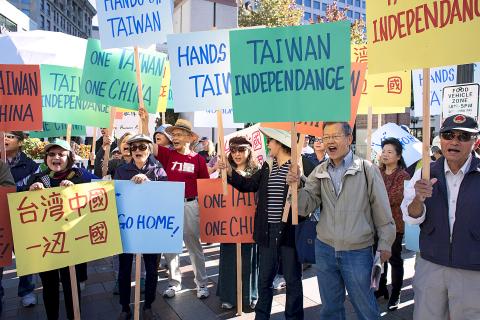US officials are reassuring Taiwan that no matter what Chinese President Xi Jinping (習近平) says about it during his summit with US President Barack Obama this week, Washington will not change its current policies.
“It is normal for a Chinese leader to raise Taiwan,” US Assistant Secretary of State for East Asia and Pacific Affairs Daniel Russel told a media briefing on Tuesday.
“We will always make clear when the issue arises that we place great importance on stability across the [Taiwan] Strait,” he said. “We respect the right of the people on Taiwan to exercise their democratic rights and will continue to counsel restraint on the part of Beijing in order to maintain trust and stability.”

Photo: Reuters
Speaking at the same event, Daniel Kritenbrink, senior director for Asian affairs at the US National Security Council, said that the US respected Taiwan’s democratic process and had a long-standing position on cross-strait issues based on the “one China” policy, the six communiques and the Taiwan Relations Act (TRA).
“Our fundamental interest is in cross-strait stability,” he said.
Russel said that the US had an immensely complex relationship with China, one that was anchored in a commitment to prevent strategic rivalry and to ensure “we are working to reconcile our respective legitimate interests.”
“We are digging down on problem areas. That will be a significant dimension of the summit. We do not paper over our differences with China on important issues,” he said. “We have serious differences over what constitutes acceptable behavior in cyberspace and in maritime space — particularly in the South China Sea.”
He said there were also differences on human rights and the treatment of civil society, as well as financial and regulatory policy. Russel said that the US was not trying to contain China and that US policy was not hostile.
“The same rights that apply to the big and strong apply similarly to the small and weak. Freedom of navigation and freedom of over-flight are not rights that one country grants to another,” he said.
“Strong and important countries like China have to ensure that small neighbors have the ability to exercise those same rights,” he said.
Xi arrived in Seattle on Tuesday and is to meet with Obama at the White House later today and tomorrow.
As Xi arrived, the New York Times said that the US and China had been negotiating what could become the first arms control accord for cyberspace with a goal of announcing an agreement during Xi’s visit.
According to the newspaper, the deal would safeguard critical infrastructure during peacetime, but was not expected to cover contentious issues such as the theft of intellectual property or data.
An article by Bloomberg predicted that Xi’s visit would be overshadowed by China’s growing military assertiveness, its expanding economic espionage and its crackdown on human rights at home.
“We have to be cognizant the level of anxiety, competition and tension in our relationship is here to stay,” former US Department of State official Kurt Campbell was quoted as saying by Bloomberg.

SECURITY: As China is ‘reshaping’ Hong Kong’s population, Taiwan must raise the eligibility threshold for applications from Hong Kongers, Chiu Chui-cheng said When Hong Kong and Macau citizens apply for residency in Taiwan, it would be under a new category that includes a “national security observation period,” Mainland Affairs Council (MAC) Minister Chiu Chui-cheng (邱垂正) said yesterday. President William Lai (賴清德) on March 13 announced 17 strategies to counter China’s aggression toward Taiwan, including incorporating national security considerations into the review process for residency applications from Hong Kong and Macau citizens. The situation in Hong Kong is constantly changing, Chiu said to media yesterday on the sidelines of the Taipei Technology Run hosted by the Taipei Neihu Technology Park Development Association. With

CARROT AND STICK: While unrelenting in its military threats, China attracted nearly 40,000 Taiwanese to over 400 business events last year Nearly 40,000 Taiwanese last year joined industry events in China, such as conferences and trade fairs, supported by the Chinese government, a study showed yesterday, as Beijing ramps up a charm offensive toward Taipei alongside military pressure. China has long taken a carrot-and-stick approach to Taiwan, threatening it with the prospect of military action while reaching out to those it believes are amenable to Beijing’s point of view. Taiwanese security officials are wary of what they see as Beijing’s influence campaigns to sway public opinion after Taipei and Beijing gradually resumed travel links halted by the COVID-19 pandemic, but the scale of

A US Marine Corps regiment equipped with Naval Strike Missiles (NSM) is set to participate in the upcoming Balikatan 25 exercise in the Luzon Strait, marking the system’s first-ever deployment in the Philippines. US and Philippine officials have separately confirmed that the Navy Marine Expeditionary Ship Interdiction System (NMESIS) — the mobile launch platform for the Naval Strike Missile — would take part in the joint exercise. The missiles are being deployed to “a strategic first island chain chokepoint” in the waters between Taiwan proper and the Philippines, US-based Naval News reported. “The Luzon Strait and Bashi Channel represent a critical access

Pope Francis is be laid to rest on Saturday after lying in state for three days in St Peter’s Basilica, where the faithful are expected to flock to pay their respects to history’s first Latin American pontiff. The cardinals met yesterday in the Vatican’s synod hall to chart the next steps before a conclave begins to choose Francis’ successor, as condolences poured in from around the world. According to current norms, the conclave must begin between May 5 and 10. The cardinals set the funeral for Saturday at 10am in St Peter’s Square, to be celebrated by the dean of the College